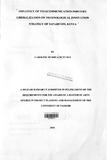| dc.description.abstract | The purpose of this study was to investigate the effect of telecom industry liberalization on Safaricom's technological innovation strategy. The World Trade Organization (WTO) has prescribed liberalization of the telecom markets in the world to facilitate growth and competition in the industries which would enhance economic and social advancement. Many countries, including Kenya, have endorsed the WTO's liberalization guidelines and opened their telecom market to many players leading to open and competitive market environment. This study therefore examined how telecommunication operators are capitalizing on technology innovation as a response to consumer demands and market changes. The study employed a descriptive survey research design. A self administered questionnaire was used as the primary data collection instrument.
The population of the study was all employees of the M-Pesa division, Safaricom Ltd. A sample of 50 respondents was selected using stratified random sampling technique. Data was analyzed with the aid of Statistical package for social scientists (SPSS) which generated results in form of percentages, frequency distributions and means scores. Presentation of the findings was in form of tables, charts and graphs.
Study findings indicate that liberalization has brought with itself challenges which have threatened many telecom industries. However Safaricom has responded swiftly to these challenges and incorporated an innovative culture which has been touted as the driver of its growth. M-Pesa represents the most successful innovation strategy in Safaricom's localization process. Study findings also indicate that there are a host of challenges brought by liberalization of the telecom industry which included cutthroat competition, increase in operating and other selling expenses, biasness of regulations which seem to favour some players, a company being forced to continuously improve its products to thrive in the industry and unwelcome government regulation.
Findings indicate that Safaricom has over the years adopted innovative policies which are touted as its vehicles to growth and advancement. Safaricom has used creativity and innovativeness to create the best products and services and it has managed to partner with other service providers. The M-Pesa product has brought many customers into the network and helped Safaricom to gain a competitive edge over its rivals. Safaricom also continuously upgrades its network and supports and rewards creative thinking. This innovation at Safaricom is backed by a full department, Value Added Service.
From the findings, the following recommendations are made: Companies in the telecom industry need to continually reinvigorate themselves to remain relevant in the telecom industry which over the years has proved to be dynamic, complex and turbulent. To ensure survival, the companies need to respond effectively to the various challenges brought about by liberalization among them cutthroat competition; The government needs to come up with effective and workable policies and regulations which when implemented will spur growth in the telecom industry and; Telecom companies need to give their clientele new and innovative products that fit their purpose and are economical. This calls for investment in incorporating a culture of creativity in employees and rewarding innovative ideas. | en_US |

